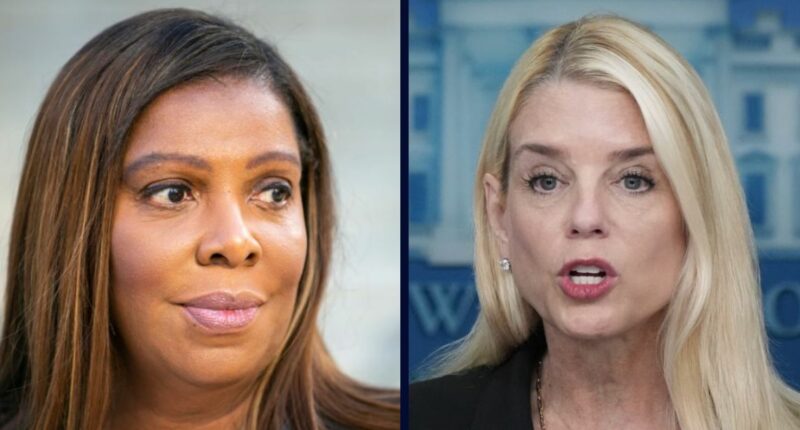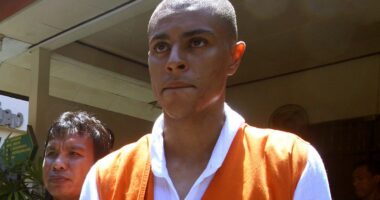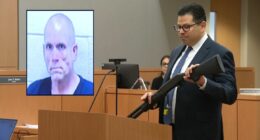Share this @internewscast.com
Left: New York Attorney General Letitia James speaks to the media, Nov. 6, 2023, in New York (AP Photo/Ted Shaffrey, File). Right: Attorney General Pam Bondi, speaks during a news conference with President Donald Trump in the James Brady Press Briefing Room at the White House, Monday, Aug. 11, 2025, in Washington (AP Photo/Alex Brandon).
In a series of unexpected developments on Tuesday, a federal prosecutor from Missouri stepped into the fray to support interim U.S. Attorney Lindsey Halligan in the bank fraud case involving New York Attorney General Letitia James. This move has sparked intrigue as the prosecutor filed a notice justifying the Department of Justice’s (DOJ) decision to delay handing over discovery materials, despite a court order, ahead of the AG’s anticipated motion to dismiss.
Roger Keller Jr., the prosecutor in question, addressed U.S. District Judge Jamar Walker in a five-page notice. He explained why the DOJ was sidestepping the judge’s directive, which they deemed “premature.” According to Keller, the Trump administration had chosen to disregard the court’s “instruction” concerning the discovery documents relevant to James’ claims of vindictive prosecution.
The notice, dated October 24, 2025, highlighted the court’s earlier decision to instruct the government to provide discovery material related to the defendant’s claims before any motion was filed. Keller argued that this directive was premature, citing that the government is not obliged to comply unless the defendant presents substantial evidence hinting at prosecutorial misconduct—a standard Keller described as “rigorous.”
Keller elaborated further, asserting that the legal framework does not permit defendants to demand discovery concerning prosecutorial decisions before they present compelling evidence of misconduct. Such was the case in the criminal proceedings of Kilmar Abrego Garcia, which set a precedent for this sequence of actions.
In essence, Keller suggested that Letitia James must first present her argument, after which the judge can decide if she has met the necessary burden of proof. He contended that the order to produce discovery prematurely absolved James of proving prosecutorial misconduct, a prerequisite to challenging the prosecution’s legality.
The filing concluded with Keller’s firm stance that the government is not obligated to release documents related to vindictive or selective prosecution until the defendant successfully challenges the presumption of the prosecution’s lawfulness. This development marks a significant moment in the ongoing legal battle, adding layers of complexity to the already contentious case.
Walker, a Joe Biden appointee, had a terse response to the DOJ’s filing, reminding the government of the discovery plan in place and that motion practice is the ordinary way to handle disputes.
“The Court has received the government’s filing regarding discovery on the issue of vindictive and/or selective prosecution. The Order on the parties’ jointly recommended discovery plan governs discovery in this case,” the judge said. “To the extent any discovery dispute arises, the parties may address it in a motion.”
Walker previously ordered that James’ motion to toss out the case on vindictive or selective prosecution grounds had to be filed by Friday.
















